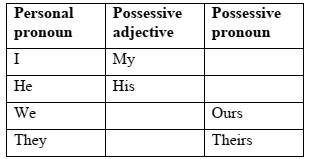Questões de Inglês - Pronomes | Pronouns para Concurso
Foram encontradas 490 questões
Observe a tabela a seguir:

Assinale a alternativa que preenche corretamente os espaços em branco na tabela acima:
Instruction: answer based on the following text.

(Available in: https://www.marthastewart.com/syndication/new-study-dogs-understand-commands-withouttraining – text adapted specially for this test).
Based on the previous text, judge the following item.
In the first paragraph, the word “It” (third sentence) refers to
“a source of standards” (second sentence).
Based on the previous text, judge the following item.
In ‘any use of English among speakers of different first
languages for whom English is the communicative medium
of choice, and often the only option’ (first paragraph), the
word ‘whom’ could be correctly replaced with who.
Text for the question.
How to Improve Your Work-Life Balance

Internet: <www.geeksforgeeks.org> (adapted).